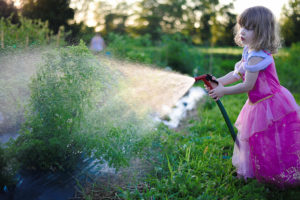
It has been a slow climb out of winter this year, but I think we’ve officially made it.
The slogan that keeps popping into my mind: “Spring has sprung!”
I can’t help but adore the birds chirping outside my window each morning and watching in excitement as the tree buds emerge a bit more each day. Bright-green sprigs are already making their way up through the dirt, announcing the arrival of spring.
It’s exciting to think about the summer to come, too.
Summer means many things to different people, but for a dietitian it’s all about fresh produce.
You can find fresh foods everywhere: roadside stands, local farmers markets and your favorite grocery stops.
For me, the start of the new season also means it’s time to start thinking about my garden. I would encourage you to consider planting a garden this year.
Why? Consider this old saw: “If you give a man a fish, he can eat for a day. Teach him to fish, he eats for a lifetime. Teach him to garden, then the whole neighborhood gets tomatoes, squash, cucumbers, melons and more.”
Growing your own food is just part of the many joys that comes with gardening. You may find great pleasure in having the ability to share your homegrown food with others.
But the joys don’t end there—and neither do the benefits.
Here’s a look at the goodness you can reap when you dig in and get your hands a little dirty:
Health and fitness
Gardening really is exercise—and an excellent low-impact exercise at that.
When you garden, you’re using many different muscle groups while increasing your flexibility and strength.
You can burn up to 45 calories in just 30 minutes of gardening. Raised beds or pots are a great way to make gardening easier for those who may struggle physically.
Cord-free living
In a plugged-in, hyper-connected world, gardening is just about the best way to unplug.
There’s something about digging in the dirt that remains original and unchanged. You have to do the work, there are no shortcuts, and you have to wait patiently for the rewards—the beautiful blooms and hearty bounty.
It’s an unbeatable way to disconnect from the sensory overload of modern society. Many people find gardening is not just an uplifting hobby but a great stress reliever. The sights, smells and sounds of gardening encourage relaxation and serenity.
For seniors, a few hours a week in the garden can help reduce social isolation.
Pure quality
Food you grow yourself can be the freshest, cleanest food you’ll eat all year.
The fruits and vegetables from your own garden pack a nutritional punch, but there’s also the gratification in knowing how it was grown and treated.
It’s often said that people who garden eat more fruits and vegetables per day than their peers. Kids who participate in gardening are also more likely to try new things and eat more fruits and vegetables on a daily basis.
There’s no denying it—homegrown food tastes the best.
If you’re considering stepping foot into the gardening world this spring, here are some quick tips to consider:
- Location, location, location. Consider how much area you have available. Do you have a plot of land, or a section that would be perfect for a raised bed? You can even use your open deck for potted plants.
- Let the sunshine in. Think about where the sun is best in your available space, and plant according to that. Gardens need plenty of sunlight to flourish.
- Water within reach. Try to plant your garden in an area where water is easily accessible.
- Start simple. Consider starting with flowers, herbs and easy vegetables such as tomatoes, peppers, lettuces, cucumbers and carrots.
Gardening is sometimes a process. It doesn’t all happen overnight and it isn’t about having a prize-winning garden. It’s about enjoying the process and the bountiful benefits.
 /a>
/a>
 /a>
/a>
 /a>
/a>
I still have many wonderful memories of helping my grandfather plant a garden when I was a child – in addition to being a healthy option for produce, it is also a great family bonding activity … kids love getting their hands dirty!
Thanks, John, for sharing such a great comment, and for being a Health Beat reader! I also have great memories of gardening as a child. This is probably why I still love it today. 🙂